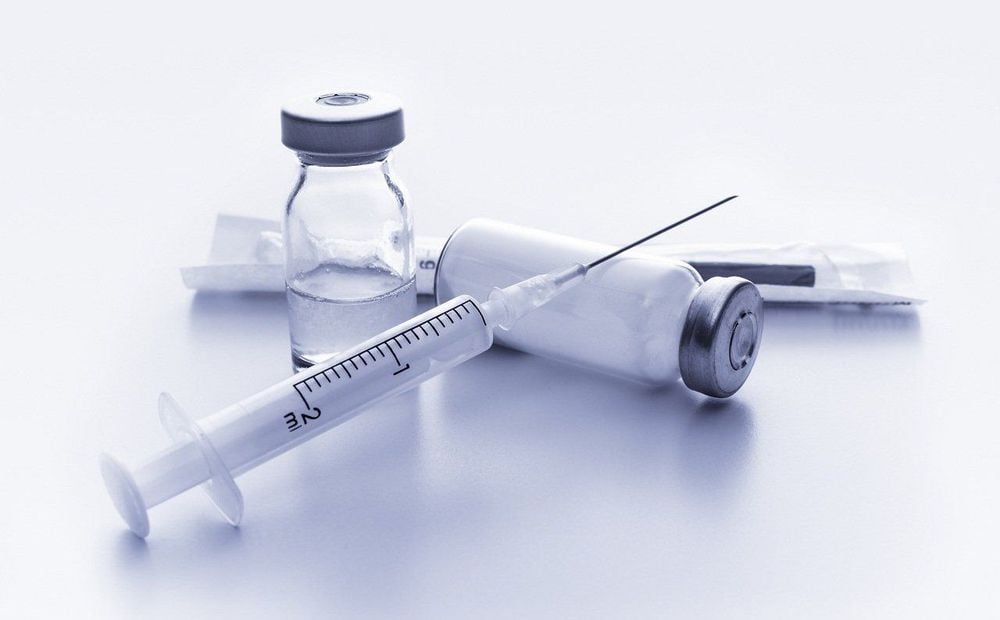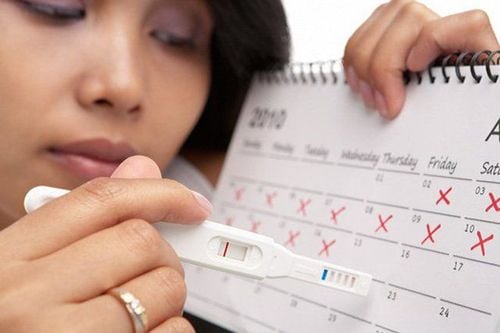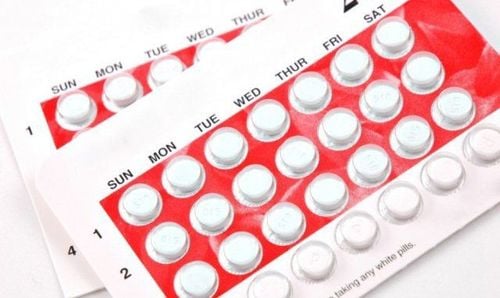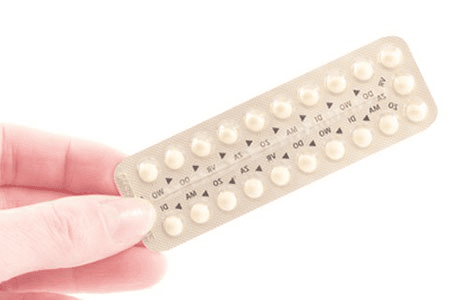This is an automatically translated article.
The article was professionally consulted by Specialist Doctor II Pham Thi Tuyet Mai - Obstetrician and Gynecologist - Department of Obstetrics and Gynecology - Vinmec Hai Phong International General Hospital.1. What is an injectable contraceptive?
The injectable contraceptive is a temporary contraceptive that is more than 95% effective and contains hormones, including progestin-only or both progestin and estrogen hormones. This drug is indicated for deep intramuscular injection, once every 1-3 months.
After injecting birth control pills, the effect lasts from 1-3 months depending on the drug, because of the long duration of action, it is not necessary to use it every day to avoid frequent forgetting to take the pill and reduce the effect. of oral contraceptives, but if there are side effects, the effects cannot be stopped immediately.
The drug works: Inhibiting ovulation, limiting the penetration of sperm, limiting the development of the lining of the uterus that is not eligible for implantation.
Indications for the use of injectable contraceptives: Women of childbearing age who want temporary contraception.

Contraindications
Absolute contraindications:
Pregnant women Having breast or ovarian cancer. Not old enough to use (under 16 years old). Relative contraindications:
Having hypertension, vascular disease. Abnormal vaginal bleeding of unknown cause. Breast cancer has been cured for 5 years. Hepatobiliary disease with impaired liver function or a tumor in the liver. Have systemic lupus erythematosus. Have a deep vein occlusion or have ever had a cerebrovascular accident or ischemic heart disease. When there is a desire to become pregnant, it is necessary to stop injecting oral contraceptives and should learn about the development of the fetus through each stage to be able to take better care of the pregnancy:
Trắc nghiệm: Bạn có hiểu đúng về dấu hiệu mang thai sớm?
Các dấu hiệu mang thai sớm không phải chỉ mỗi trễ kinh mà còn có rất nhiều dấu hiệu khác như xuất huyết âm đạo, ngực căng tức,… Điểm xem bạn biết được bao nhiêu dấu hiệu mang thai sớm thông qua bài trắc nghiệm này nhé!
2. What are the side effects after injecting birth control pills?
Like oral contraceptives, injectables also have the following side effects:
Amenorrhea Amenorrhea is more common with progestin-only injectables because the uterine lining does not thicken and and fall off, so no menstrual phenomenon is seen.
Amenorrhea occurs in most women when using injectable contraceptives, up to 60% of women experience this condition.
This phenomenon does not harm the woman's body and future reproductive health, so it is still possible to continue using injectable contraceptives if amenorrhea is acceptable.
Although the contraceptive effectiveness of the injection is very high, there is still a very small risk of pregnancy. Because this phenomenon resembles pregnancy, if pregnancy is suspected, testing should be done to confirm pregnancy. If the pregnancy can be kept because there is no evidence that using this drug harms the fetus, it is best to go to a medical facility for specific advice not to rush to terminate the pregnancy immediately.

Irregular menstrual periods This is also common in people using hormonal birth control, and can go away after a few months of injections. B , so you can still continue to inject birth control pills.
If heavy bleeding causes iron in the blood, you should increase the use of iron-rich foods or take iron supplements to limit the risk of iron-deficiency anemia. If the condition affects health or does not improve with subsequent injections, another method of contraception should be used.
Menorrhagia is abnormal vaginal bleeding that is not related to the menstrual cycle. First of all, it is necessary to find other causes of this condition, after ruling out other causes, continue to use oral contraceptives, this phenomenon will go away on its own without needing any treatment.
Headache After injecting birth control pills, you may have a headache, if the pain is unbearable, you can use one of the pain relievers containing ibuprofen or paracetamol.
If the headache is severe and does not subside after taking the medicine, a comprehensive examination should be done to find other causes. Discontinue injection if headache is accompanied by blurred vision, non-hormonal contraception should be used.
Weight gain The injectable contraceptive can lead to rapid weight gain, which lasts over time with the pill. If after taking the drug, the weight gain is rapid and out of control, you can go to a medical facility to be consulted by a doctor to change to another temporary contraceptive method.
Osteoporosis Oral contraceptives reduce bone mineralization, causing osteoporosis in women of any age. This condition is common in women who have used the injection for more than 2 years, using it for less than 2 years is not or less common.
Pregnancy-like symptoms Using injectable oral contraceptives can cause some pregnancy-like symptoms such as breast engorgement, lower abdominal pain, mood swings (fatigue, irritability), nausea. . This condition can go away on its own, if it persists, it needs to be treated.
At the injection site At the injection site, there may be swelling, hot, red, pain: Usually it will go away after a few days, maybe warm compresses will go away faster.
Abscess at the injection site is very rare: In addition to hot, red, painful swelling at the injection site, there is also a lump protruding from the skin surface, festering, possibly accompanied by a mild fever. When seeing this phenomenon, it is necessary to go to a medical facility for an incision to drain the pus.
Above are some phenomena and ways to solve problems after using oral contraceptives. When you want to use this method of contraception, you need to go to a medical facility specializing in obstetrics and gynecology for examination, advice and selection of the most suitable contraceptive method.
When there is a desire to become pregnant, in order to prepare for a healthy pregnancy, both husband and wife should check their reproductive health 3-5 months before becoming pregnant.
The wife should:
Get vaccinated before pregnancy (especially against rubella because rubella in pregnancy is extremely dangerous ) Genetic testing to screen for genetic diseases before pregnancy Check for secondary infections In particular, women over 35 years of age, if they want to become pregnant (especially if they have never been pregnant), will have to have a very detailed health check because pregnancy at this age often problems: Ovarian failure, premature birth, higher risk of birth defects, placenta previa, preeclampsia. The husband should:
Check reproductive health, detect diseases of testicular atrophy, physiological weakness, weak sperm... Sexually transmitted diseases, especially those that cannot be cured, are extremely dangerous. Vinmec currently has many comprehensive health care programs for couples, pregnant mothers and their unborn babies, including basic pre-marital examination packages, advanced pre-marital examination packages, and maternity packages. . Vinmec has a team of experienced doctors in the fields of obstetrics and gynecology, IVF, stem cells, gene technology, capable of synchronously and comprehensively deploying the most advanced assisted reproductive techniques today.
For specific information about fertility and maternity packages at Vinmec, please contact the hospitals and clinics of Vinmec health system nationwide.
Please dial HOTLINE for more information or register for an appointment HERE. Download MyVinmec app to make appointments faster and to manage your bookings easily.














